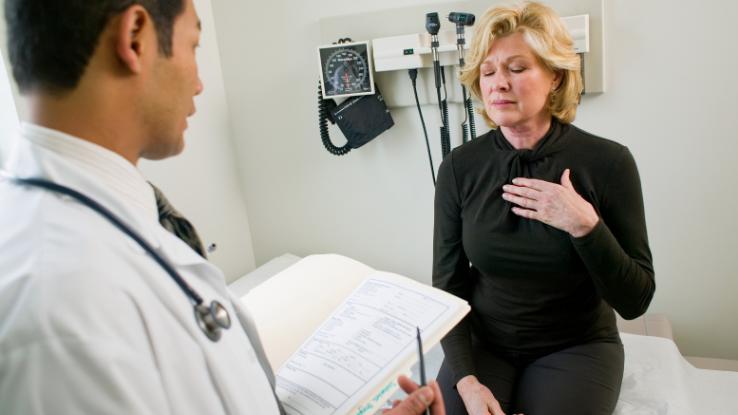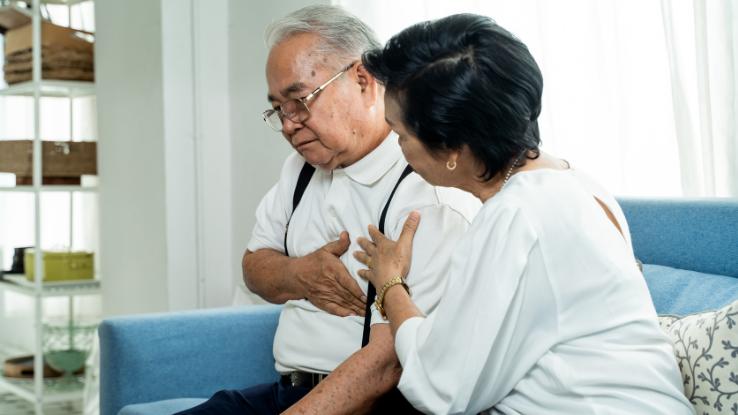
It can be difficult to distinguish between heartburn pain and chest pain caused by a more sinister, cardiac problem. Both heartburn and cardiac pain can come on suddenly and cause discomfort in the chest; however, there are ways to distinguish between the two pains. In fact, heartburn is not actually related to the heart, while other types of chest pain can be a sign of cardiac problems.
If you are not sure what is causing a persistent chest pain, call 911 for emergency medical assistance.
What Is Heartburn?
Heartburn, also known as acid reflux, occurs when stomach acid backs up into the esophagus, the tube that carries food into your stomach when you swallow. The esophageal sphincter is at the top of the stomach, and normally acts like a valve to prevent stomach acid from traveling up to the esophagus. However, in the case of heartburn, acid gets through the valve, irritates the esophagus, and causes the characteristic burning sensation felt in the chest and throat.

Most often, heartburn occurs after a meal, and can be particularly severe after a large, fatty or spicy meal. Heartburn also commonly occurs during pregnancy since the hormone progesterone, which is produced during pregnancy, causes the esophageal sphincter muscle to relax. Later in a pregnancy, the growing baby puts extra pressure on the stomach, which may also push stomach acid up. When heartburn occurs frequently, it may indicate a condition called gastroesophageal reflux disease (GERD).
What Are the Causes of Chest Pain?
Chest pain can be caused by lots of different medical problems, which range from minor problems to life-threatening conditions. One serious cause of chest pain is a heart attack, which occurs when the blood supply to the heart is reduced. Additionally, transient chest pain can occur in angina, a condition where chest pain is precipitated by exercise, and relieved by rest. Angina is also caused by problems in the blood supply to the heart.

In addition to a heart attack and angina, chest pain can also be caused by other cardiac problems, such as inflammation of the outer surface of the heart (pericarditis), or of the heart muscles itself (myocarditis). Certain respiratory conditions can also cause chest pain, including pneumonia, a blood clot in the lung (pulmonary embolism), and a severe asthma attack. Musculoskeletal causes of chest pain include muscle strains and inflammation of the cartilage in the ribcage (costochondritis). The skin of the chest can become painful, particularly in a bout of shingles. Moreover, severe panic attacks can also cause chest pains.
The Characteristics of Chest Pain
Although both cardiac-related chest pain and heartburn can cause pain, there are usually several differences in these types of pain. Heartburn normally manifests as a burning sensation in the center of the chest, behind the breastbone, which in some cases can spread to the throat. Chest pain, which is cardiac in nature, is usually described as tight or crushing pain in the chest. Cardiac chest pain may also spread to the left shoulder, arm or jaw.

What you were doing just before the pain came on can also indicate where the pain is coming from. Heartburn is typically precipitated by a meal, especially if fatty or spicy food was eaten. It is made worse by bending over or lying down. Cardiac chest pain may start at any time, but is frequently associated with exertion. Cardiac chest pain may be relieved with rest, and sitting down may help.
Symptoms Associated With Heartburn and Chest Pain
Another important way to distinguish between heartburn and cardiac chest pain is by considering other symptoms that may be present. Heartburn is typically accompanied by a sour taste in the mouth, or the sensation of food contents coming up into the throat or mouth. These symptoms are usually made worse by straining or bending over. Cardiac chest pain, however, is typically accompanied by feeling generally unwell, breathless, sweaty and/or lightheaded.

Heartburn:
- Site: Typically the center of the chest, behind the breastbone.
- Onset: Comes on gradually.
- Timing: Typically occurs after eating.
- Character: Burning discomfort.
- Radiation: Can spread up towards the throat.
- Associated Symptoms: Unpleasant taste in the mouth, regurgitation of foodstuffs.
- Exacerbating Factors: Exacerbated by lying down, bending over or straining.
- Relieving Factors: Relieved by sitting upright, antacids.
- Severity: Mild to moderate, rarely severe.
- History: History of acid reflux before.
Cardiac Chest Pain:
- Site: Typically center of the chest.
- Onset: Comes on suddenly.
- Timing: Typically occurs following exertion and lasts for more than 20 minutes.
- Character: Tight, crushing, “vice-like.”
- Radiation: Can spread to the left chest, shoulder, arm or jaw.
- Associated Symptoms: Sweating, breathlessness, nausea, lightheadedness, racing heart, and collapse.
- Exacerbating Factors: Exacerbated by exercise.
- Relieving Factors: Relieved by rest (angina); sometimes not relieved by rest (myocardial infarction, heart attack); relieved by nitroglycerin.
- Severity: Moderate to severe.
- History: History of heart problems or angina.
How to Treat Chest Pain
Treatments for heartburn and other types of chest pain are very different. Treatment for heartburn usually consists of lifestyle changes, such as losing weight, if needed; quitting smoking; and changing certain eating habits. Antacids may also be recommended, which neutralize stomach acid and provide symptomatic relief. For longer term prevention of damage, you may be recommended a proton pump inhibitor or a H2-receptor antagonist to reduce the production of stomach acid.

Treatment for chest pain will depend on whether the pain is due to a cardiac problem or not. Furthermore, cardiac chest pain will require medical testing to determine the exact cause. In some instances, surgical procedures to unblock the arteries to the heart may be required. Medication may also be prescribed to treat chest pain, such as nitroglycerin, to relax the arteries. Blood thinners and anti-clot medication may be required long term.
Keep in mind, chest pain can be a symptom of a life-threatening condition and should not be ignored. Even if you think it is heartburn and the pain goes away, it should still be checked out by a doctor. If you are worried a pain in the chest is something sinister, you are better to make an emergency call than risk your life.
When Should You Call 911?
These “red flag” features indicate there may be a more sinister cause for chest discomfort, and necessitate an emergency call:

- The pain is worse than any other pain you have felt before.
- You are feeling breathless.
- You are feeling sweaty or generally unwell.
- The pain is radiating to your left chest, shoulder or jaw.
- You feel lightheaded.
- You have a history of heart problems.
- The pain is getting worse.
- The pain occurred following strenuous exercises.
- You are coughing up blood.
- You have a fever.
Resource Links:
- Medline Plus (2021). Gastroesophageal reflux disease.
- NHS Inform (2020). Gastro-oesophageal reflux disease (GORD).
- Mayo Clinic (2020). Gastroesophageal reflux disease.
- NHS (2020). Heartburn and acid reflux.
- BMJ Best Practice (2019). Gastro-oesophageal reflux disease.
- National Institute of Diabetes and Digestive and Kidney Diseases (2020). Acid Reflux (GER & GERD) in Adults.
- BMJ Best Practice (2020). Patient Information: Heartburn.
- Mayo Clinic (2017). Heartburn or heart attack: When to worry.
- NICE (2020). Clinical Knowledge Summary: Chest Pain (2020).





